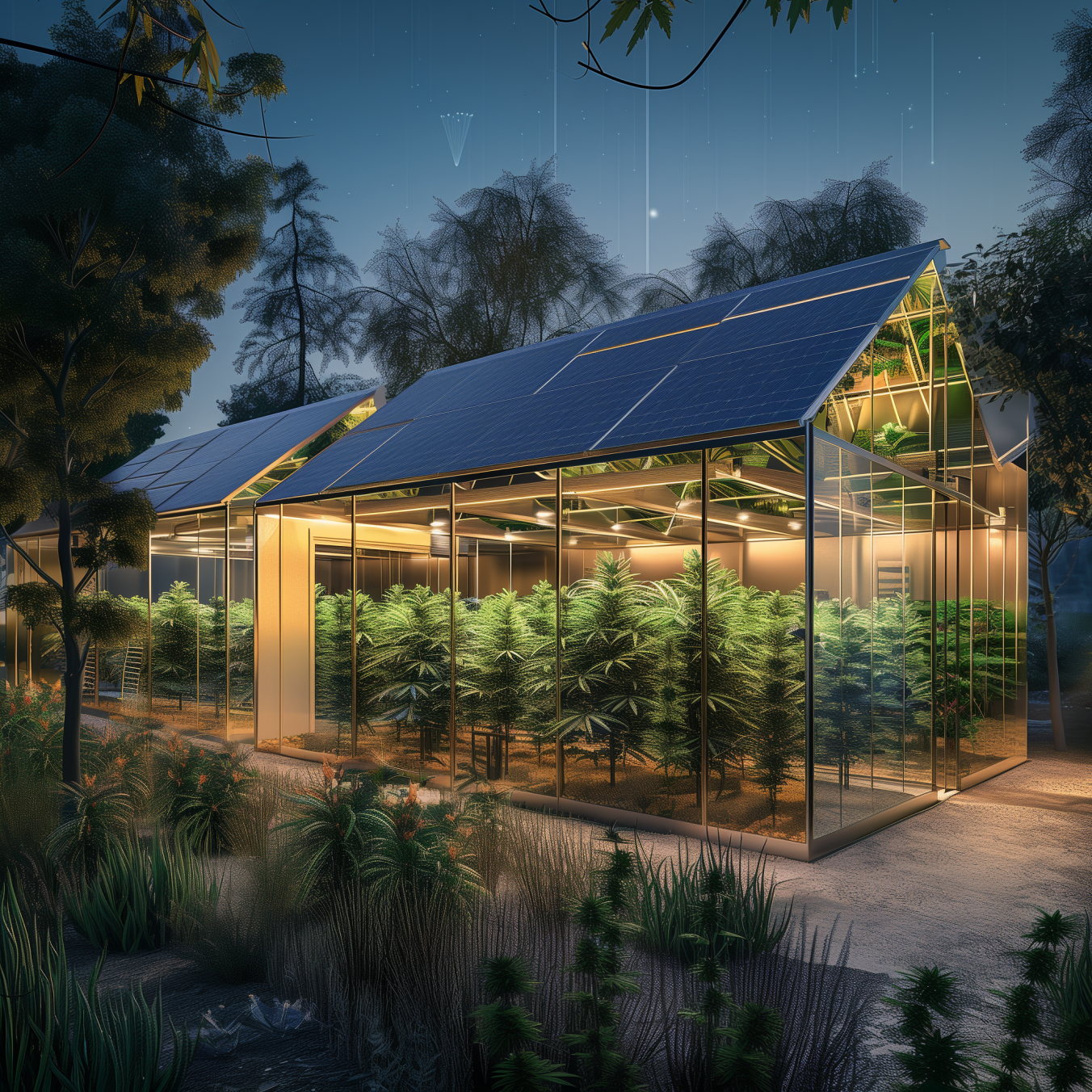The Environmental Impact of Cannabis Cultivation
Let’s face the facts: traditional cannabis cultivation uses a lot of electricity and water, and it has a significant carbon footprint. But there’s good news on the horizon!
Renewable Energy Solutions
Companies are now turning to renewable energy sources like solar power, wind energy, and hydropower to grow cannabis more sustainably. These methods are not only environmentally friendly but also cost-effective.
Solar Power: Utilizing solar panels allows cannabis growers to harness the power of the sun to generate electricity. This renewable energy source not only reduces greenhouse gas emissions but also lowers operational costs over time. By installing solar arrays on their farms or indoor facilities, companies can produce clean energy while minimizing their reliance on fossil fuels.
Wind Energy: Embracing wind energy involves installing turbines that convert wind into electricity. This approach is particularly effective in regions with consistent wind patterns, providing a reliable and renewable energy source for cannabis cultivation. Wind power offers long-term financial benefits through reduced energy bills and can contribute to local energy independence.
Hydropower: Harnessing the energy of flowing water, hydropower systems can be integrated into cannabis cultivation operations near rivers or streams. Hydropower is known for its reliability and minimal environmental impact compared to traditional energy sources. It enables cannabis companies to operate sustainably while preserving water resources and supporting aquatic ecosystems.
Cost-Effectiveness: Beyond their environmental benefits, renewable energy sources offer compelling economic advantages for cannabis businesses. Initial investments in solar panels, wind turbines, or hydropower systems can be offset by long-term savings on energy bills. Moreover, governments and local authorities often provide incentives, tax credits, and grants to encourage the adoption of renewable energy, further enhancing the financial viability of these projects.
By transitioning to renewable energy sources, cannabis companies not only reduce their carbon footprint and environmental impact but also position themselves as leaders in sustainable agriculture. This proactive approach not only benefits the planet but also strengthens brand reputation, attracts environmentally conscious consumers, and ensures long-term profitability in a rapidly evolving industry landscape.
Case Studies and Success Stories
Several cannabis companies have emerged as pioneers in promoting renewable energy within the industry. Here are a few notable examples:
- Flow Kana: Based in California, Flow Kana has positioned itself as a leader in sustainable cannabis farming practices. They prioritize outdoor cultivation methods that minimize energy use and environmental impact. Flow Kana emphasizes solar power and other renewable energy sources in their operations, striving for eco-friendly practices throughout their supply chain.
- Canopy Growth Corporation: One of the largest cannabis companies globally, Canopy Growth has made significant strides towards sustainability. They have implemented renewable energy solutions across their facilities, including solar energy installations and energy-efficient technologies. Canopy Growth aims to reduce greenhouse gas emissions and operational costs through these initiatives.
- Cresco Labs: Operating in multiple states across the U.S., Cresco Labs has integrated renewable energy into their cultivation and production processes. They have invested in solar power projects to power their facilities, reducing their reliance on conventional energy sources. Cresco Labs focuses on sustainability as a core value, striving to set industry standards for environmental responsibility.
- Aurora Cannabis: Known for their global presence in the cannabis market, Aurora Cannabis has prioritized sustainability through renewable energy initiatives. They have implemented solar energy systems and energy-efficient technologies in their Canadian and international facilities. Aurora Cannabis aims to achieve carbon neutrality and reduce environmental impact across their operations.
- Tilray (now merged with Aphria to form Tilray Brands): Tilray has taken steps towards sustainability by integrating renewable energy into their cannabis cultivation and processing facilities. They have invested in solar power and energy-efficient infrastructure to minimize their carbon footprint. Tilray continues to explore innovative ways to enhance sustainability within the cannabis industry.
These companies demonstrate a commitment to environmental stewardship by leveraging renewable energy sources such as solar power and implementing energy-efficient technologies. By adopting sustainable practices, they not only reduce operational costs but also contribute positively to environmental conservation efforts. Their initiatives set benchmarks for sustainability within the cannabis industry and inspire other companies to follow suit in promoting renewable energy.
Herbal Risings: One of the first career-centered cannabis training companies, Herbal Risings strives to implement the highest quality of standards in cannabis education and industry training. By continually evolving, Herbal Risings is developing a pioneering course tailored to train business units within the cannabis industry. This comprehensive training program aims to equip participants with essential skills and knowledge to excel in various facets of cannabis business operations, emphasizing compliance, customer service excellence, and sustainable practices. Herbal Risings’ commitment to innovation and education underscores its mission to elevate standards across the cannabis industry, empowering businesses to thrive in a rapidly growing and regulated market.
Benefits of Renewable Energy in Cannabis Production
Switching to renewable energy brings a multitude of benefits that extend beyond immediate financial gains. First and foremost, it significantly reduces greenhouse gas emissions, which are major contributors to climate change. By harnessing solar power, wind energy, or hydropower, cannabis companies can minimize their carbon footprint and play a pivotal role in combating global warming.
Financially, the transition to renewable energy offers substantial long-term savings on energy bills. Unlike fossil fuels, which are subject to price fluctuations and environmental costs, renewable energy sources provide stable and predictable energy costs over time. This financial stability not only improves profitability but also enhances business resilience in a competitive market.
Moreover, adopting renewable energy practices resonates strongly with environmentally conscious consumers. In today’s socially aware marketplace, consumers increasingly prioritize sustainability when making purchasing decisions. Companies that demonstrate a commitment to renewable energy and environmental responsibility are more likely to attract and retain these discerning consumers, thereby bolstering brand loyalty and market share.
Beyond consumer appeal, embracing renewable energy positions cannabis companies as leaders in corporate social responsibility. It fosters positive relationships with communities, regulators, and stakeholders who value sustainable business practices. This proactive stance not only enhances corporate reputation but also mitigates regulatory risks and fosters a supportive operating environment.
The benefits of switching to renewable energy in cannabis production are manifold: from mitigating climate impact and reducing operational costs to strengthening consumer trust and fostering sustainable growth. By prioritizing renewable energy, cannabis companies can achieve both environmental stewardship and economic success in an increasingly sustainable-focused global economy.
How to Transition to Renewable Energy
If you’re in the cannabis industry and want to go green, start by assessing your energy needs and exploring financing options. Partner with renewable energy providers to make the switch, and monitor your progress.
The Future of Renewable Energy in Cannabis
Looking ahead, advancements in renewable energy technology promise even more sustainable practices. The future looks bright for a cannabis industry that leads in environmental responsibility.
The shift to renewable energy in cannabis cultivation is not just a trend—it’s a vital step towards a greener future. Let’s celebrate the companies paving the way and encourage others to join in this important journey.






